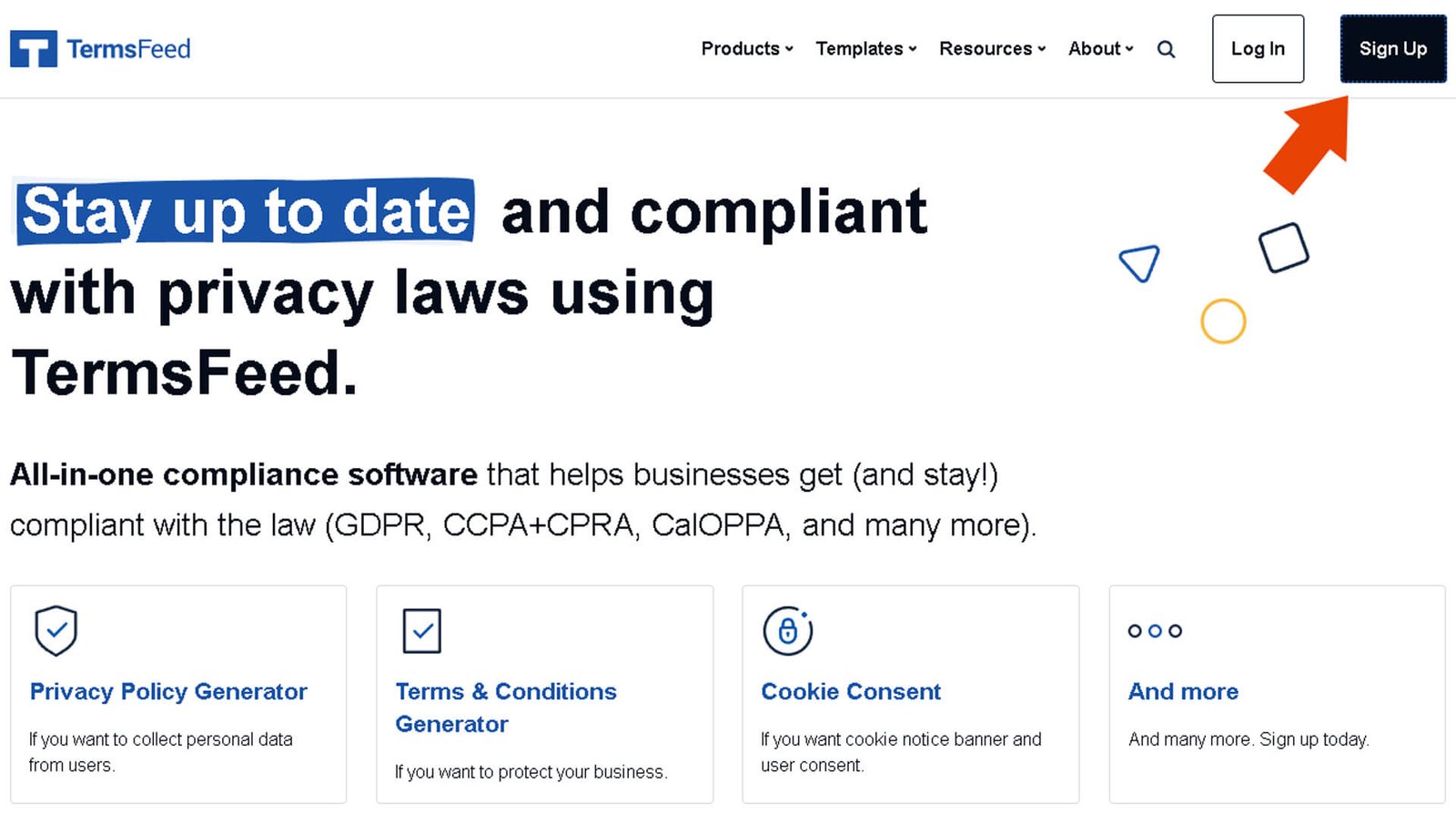Table of Contents
Can You Copy a Privacy Policy From Another Blog or Website?
The short answer is no. Citing a Privacy Policy from another blog or website is not ideal. A Privacy Policy is a legal document that explains how an organization collects, uses, and safeguards the personal information of its website visitors.
One of the main reasons why a Privacy Policy is essential is to ensure compliance with data protection laws. Many countries have regulations, such as the General Data Protection Regulation (GDPR) in the European Union, which require websites to have a Privacy Policy that clearly explains how user data is handled.
Having a well-drafted Privacy Policy demonstrates transparency and builds trust with your audience. Users want to know that their personal information will be handled responsibly and securely. A comprehensive Privacy Policy can help reassure them that their data will not be misused or shared without their consent.
In addition to legal compliance and building trust, a Privacy Policy can protect you from potential legal issues. A clear and explicit Privacy Policy can prove your commitment to protecting user information if there are any disputes regarding data handling or privacy concerns.
Overall, understanding the importance of a Privacy Policy for your blog or website is essential for legal compliance and maintaining trust with your users. It helps safeguard personal data and demonstrates your commitment to respecting user privacy in an increasingly digital world.
The Role and Purpose of a Privacy Policy

In today’s digital age, where personal data is constantly being collected and processed, ensuring the privacy and protection of user data has become a critical concern for individuals and businesses alike. This is where a Privacy Policy comes into play.
A Privacy Policy serves as a legal document that outlines how an organization collects, uses, stores, and protects the personal information of its users or customers. It acts as a transparent communication tool between the company and its users, informing them about their rights regarding their data.
A well-crafted Privacy Policy, whether a website or a blog, is essential. It helps establish trust with your audience and demonstrates your commitment to safeguarding their sensitive information.
The primary purpose of a Privacy Policy is to inform users about the types of data you collect from them, how it will be used, who will have access to it, and how it will be protected. It also clarifies the legal obligations both parties must adhere to to ensure compliance with relevant data protection laws.
By having a comprehensive Privacy Policy, organizations can demonstrate their dedication to maintaining user data privacy while transparently handling sensitive information. This helps build user trust and ensures legal compliance in an increasingly regulated digital landscape.
We will delve deeper into the key components that should be included in an adequate Privacy Policy, explore best practices for creating one that meets legal requirements and user expectations, and guide you through creating a comprehensive Privacy Policy.
Do Blogs Need a Privacy Policy? Exploring Legal Requirements and Leading Practices
A Privacy Policy document is legally required for your WordPress blog or website if you intend to collect, use, or transmit user information. This section will teach you about the legal requirements and best practices for privacy policies. This information will help you ensure compliance with data protection laws and maintain your users’ data privacy.
One of the essential legal requirements for blogs is the inclusion of a Privacy Policy. A Privacy Policy is a transparent communication tool between the blog owner and its users, outlining how personal information is collected, stored, and used. It helps build trust with readers by assuring them that their data will be handled responsibly.
Compliance with data protection laws such as CCPA and GDPR is essential for WordPress blogs and websites. These regulations provide guidelines on how personal data should be processed and protected.
California Privacy Rights Act (CPRA), an amendment to CCPA, further strengthens privacy rights by imposing stricter obligations on businesses handling consumer data. Blog owners must know these regulations and take the necessary steps to comply.
A comprehensive Privacy Policy addressing these legal requirements can help protect blog owners and their readers from potential legal issues. It should clearly state what types of personal information are collected, how they are used, who has access to them, and how users can exercise their rights regarding their data.
Leading practices for blog privacy policies include regularly updating them to reflect changes in data collection practices or applicable laws. Additionally, providing clear instructions on opt-out or unsubscribing from communications can enhance the user experience and demonstrate a commitment to transparency.
A well-crafted Privacy Policy is crucial for blogs to comply with legal requirements, such as CPRA and GDPR. By prioritizing user privacy through transparent communication of data handling practices, blog owners can foster trust among readers while safeguarding themselves against potential legal issues.
The Importance of a Privacy Policy for Your WordPress Blog or Website
Privacy is a significant concern for both individuals and businesses nowadays. If you own a WordPress blog or website, having a Privacy Policy in place is crucial. This policy protects your users’ personal information and ensures compliance with privacy regulations.
A Privacy Policy is a legal document outlining how you collect, use, store, and protect personal information gathered from your visitors or users. It helps build trust and transparency by informing your audience about the steps you take to safeguard their data.
Data privacy protects an individual’s personal information from unauthorized access or misuse. With the increasing number of cyber threats and data breaches, it is essential to prioritize data privacy to maintain the integrity and reputation of your WordPress site.
WordPress offers a range of Privacy Policy plugins to help businesses comply with regulations like the CCPA and GDPR. For example, plugins like CookieYes! ensure data protection and privacy compliance on WordPress websites. They simplify creating and managing comprehensive privacy policies tailored to your website’s needs with a few configurations.
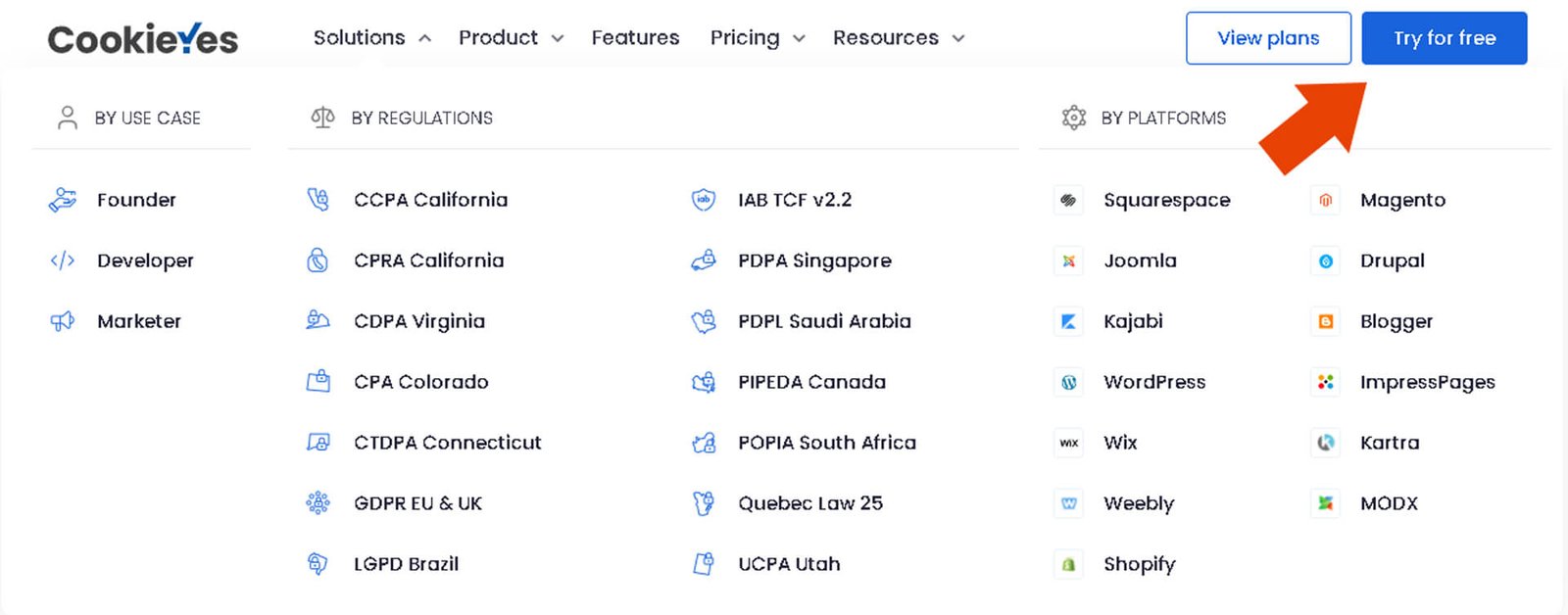
Privacy notices serve as an essential component of a Privacy Policy. They inform users about their rights regarding their data, including how it is collected, processed, stored, shared, and retained by your website or blog.
By implementing a robust Privacy Policy supported by appropriate WordPress plugins and adhering to relevant regulations like CPRA and GDPR compliance, you demonstrate your commitment to protecting user data while establishing credibility with your audience.
Navigating CPRA and GDPR: Understanding the New Privacy Regulations and Their Impact on Your Privacy Policy
Businesses must prioritize understanding and adhering to privacy regulations such as CPRA and GDPR to navigate the digital landscape successfully. Privacy regulations influence privacy policies. They necessitate companies to be transparent about their practices regarding collecting, using, and safeguarding personal data.
When creating or updating your Privacy Policy to comply with CPRA and GDPR, it is essential to include specific elements. For GDPR compliance, your Privacy Policy should outline the legal basis for processing personal data, provide information on data retention periods, explain individuals’ rights regarding their data, and detail how you handle international data transfers.
Regarding CPRA compliance, which amends the existing California Consumer Privacy Act (CCPA), businesses must ensure that their privacy policies reflect new requirements. This includes providing a clear opt-out option for consumers regarding selling their personal information and offering additional protections for sensitive personal data.
If you want to get approved for Google Adsense or other advertising platforms on your website or blog post, it’s essential to understand their specific requirements for GDPR compliance. These platforms often require publishers to make certain disclosures in their privacy policies relating to personalized advertising and user consent.
Regularly reviewing and updating your Privacy Policy and Cookies Policy is vital as regulations evolve. Staying informed about changes in CPRA or GDPR guidelines ensures that your business complies with these essential privacy regulations. This not only safeguards user trust but also protects sensitive information.
Choosing the Right Template: How to Craft a Comprehensive and Compliant Privacy Policy
Choosing a suitable template for your Privacy Policy is crucial to ensure it is comprehensive and compliant with relevant laws and regulations. Thankfully, several Privacy Policy generators are available, such as Termly, GetTerms, and TermsFeed, that can assist you in creating a legally sound document.
When selecting a Privacy Policy template, it is essential to consider a few key factors. First, ensure that the template aligns with the specific needs of your website or business. Different industries may have unique requirements for data collection and processing.
Next, consider the jurisdiction in which your business operates. Privacy laws can vary from country to country or even within different states or regions. Make sure the template you choose reflects the applicable laws in your jurisdiction.
Once you have selected a suitable template, customization is essential. Tailor the document to reflect how your website collects and uses data accurately. Add necessary clauses such as information about cookies, analytics tools used on your site, and any third-party service providers involved in data processing.
Remember that privacy policies should be written in clear and understandable language for users. Avoid complex legal jargon whenever possible.
Regularly review and update your Privacy Policy as new regulations emerge or if there are changes in how you handle user data. This will help maintain compliance with evolving legal requirements and build trust with your users regarding their privacy concerns.
Following these guidelines when choosing and customizing a Privacy Policy template, you can craft a comprehensive document that protects your business interests and user privacy rights.
Create an Effective Privacy Policy for Your Real Estate Website: Key Considerations
Creating an adequate Privacy Policy for your real estate website is crucial to ensure compliance with data protection laws and build trust with your users. This section will provide critical considerations to help you draft a comprehensive Privacy Policy that addresses the unique aspects of the real estate industry.
When collecting user information on your real estate website, it is essential to clearly state what types of data you collect, such as names, contact details, or property preferences. Additionally, please explain how this information will be used, whether it’s for property listings, personalized recommendations, or communication purposes.
To ensure legal compliance and transparency, include information on storing and protecting user data. This may involve outlining security measures implemented to safeguard personal information from unauthorized access or disclosure.
Consider incorporating a section on cookies and tracking technologies used on your website. Explain what cookies are used (e.g., analytics cookies or advertising cookies) and provide users with options to manage their cookie preferences.
If you use third-party services or share user data with partners (e.g., mortgage lenders or property agents), disclose this in your Privacy Policy. Specify the purpose of sharing data and ensure that these third parties adhere to privacy regulations.
Consider using a Privacy Policy builder tool designed for real estate websites to make the process easier. These tools can help generate a customized Privacy Policy template based on industry-specific requirements while ensuring legal compliance.
Remember that a well-crafted Privacy Policy protects user data and enhances transparency and trust in your real estate business. Regularly review and update your policy as needed to reflect any changes in regulations or practices within the industry.
Using TermsFeed to generate a Privacy Policy
In this section of the article, we will show you how we created a compliant Privacy Policy for our website using TermsFeed is an all-in-one compliance service that you can use to generate Privacy Policy, Terms and conditions, Cookie Consent Notice Banner, EULA, Disclaimer and more. We trust and use TermsFeed for most of our legal documents, including our Cookie Policy, Terms and Conditions, and Privacy Policy, which we will show you how to create in a few easy steps. TermsFeed also provides website Privacy Policy examples on its website.
Create a Free Privacy Policy: Step-by-step Guide
Step 1: Navigate to TermsFeed and sign up for a free TermsFeed account.
Step 2: Once at the “Sign Up” page, enter your email address and a strong password, and confirm the password you just entered.
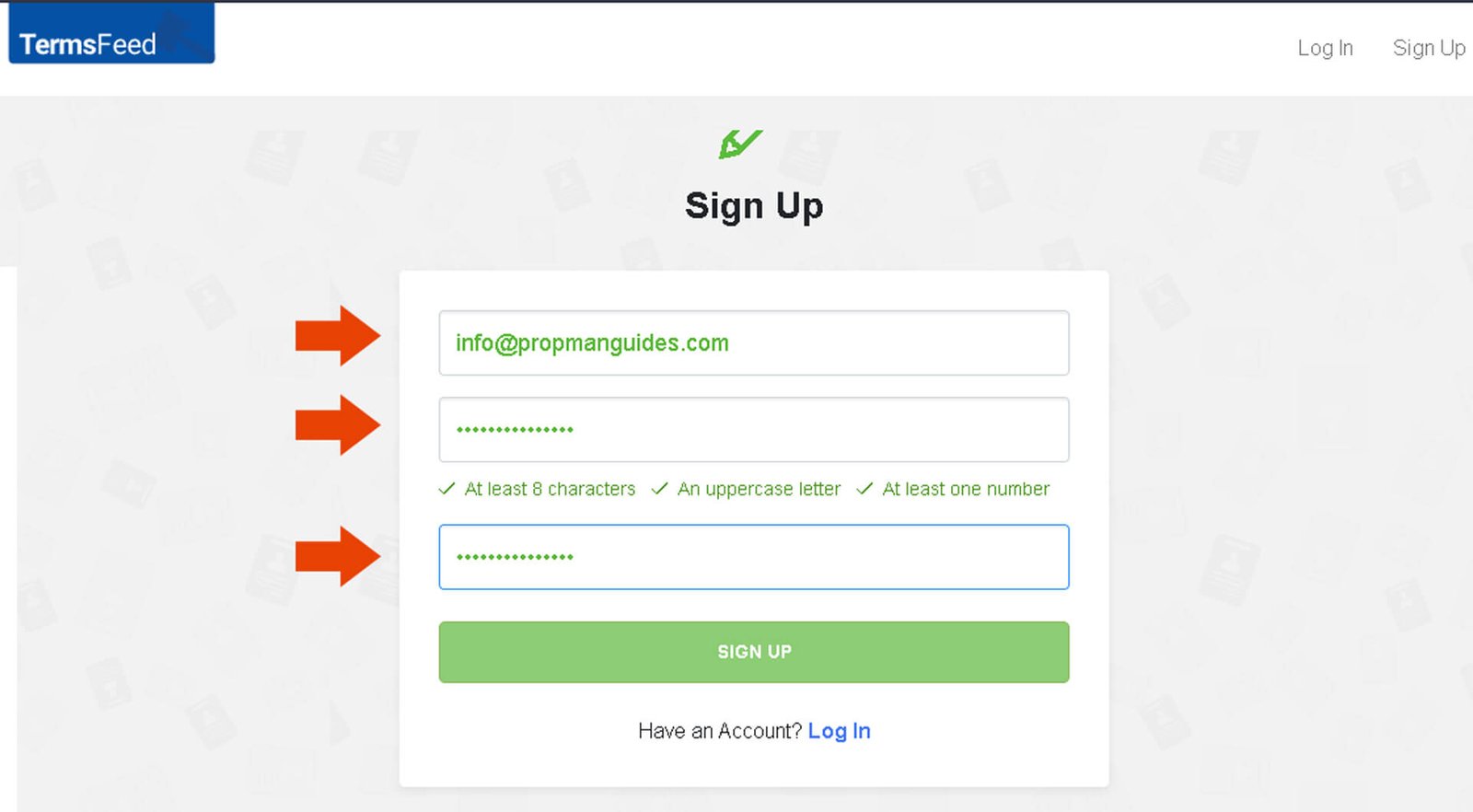
Step 3: The next screen will prompt you that your sign-up was successful and confirm the email address provided.
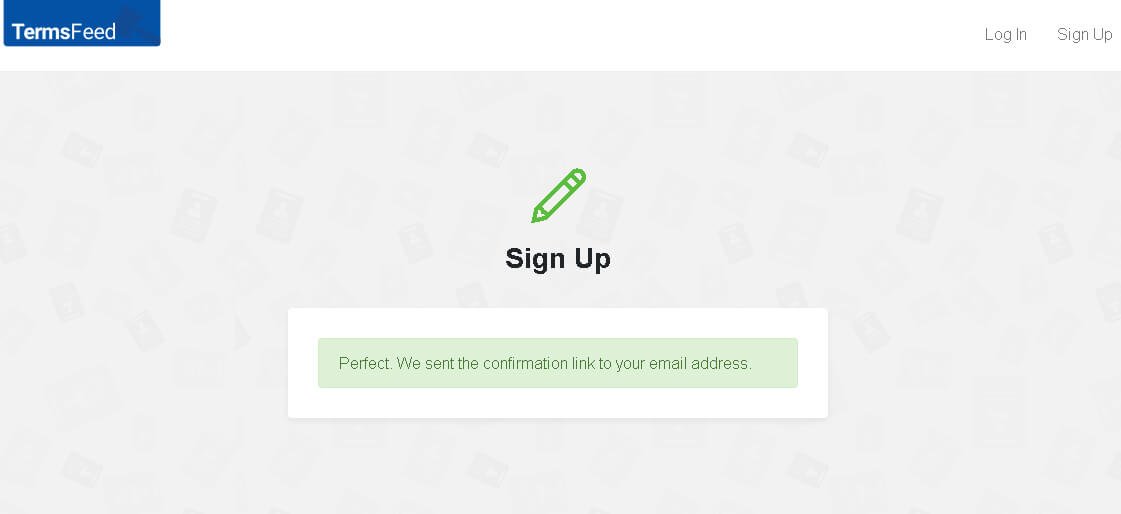
Step 4: Check your email for your TermsFeed account confirmation to activate your account.
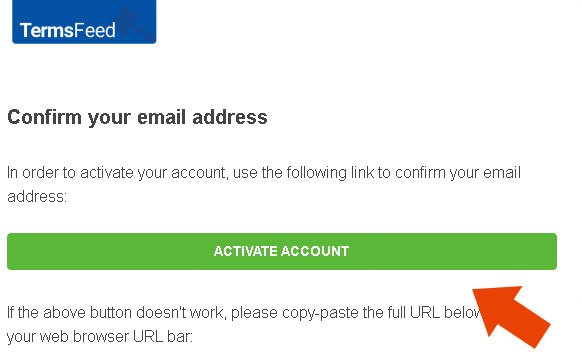
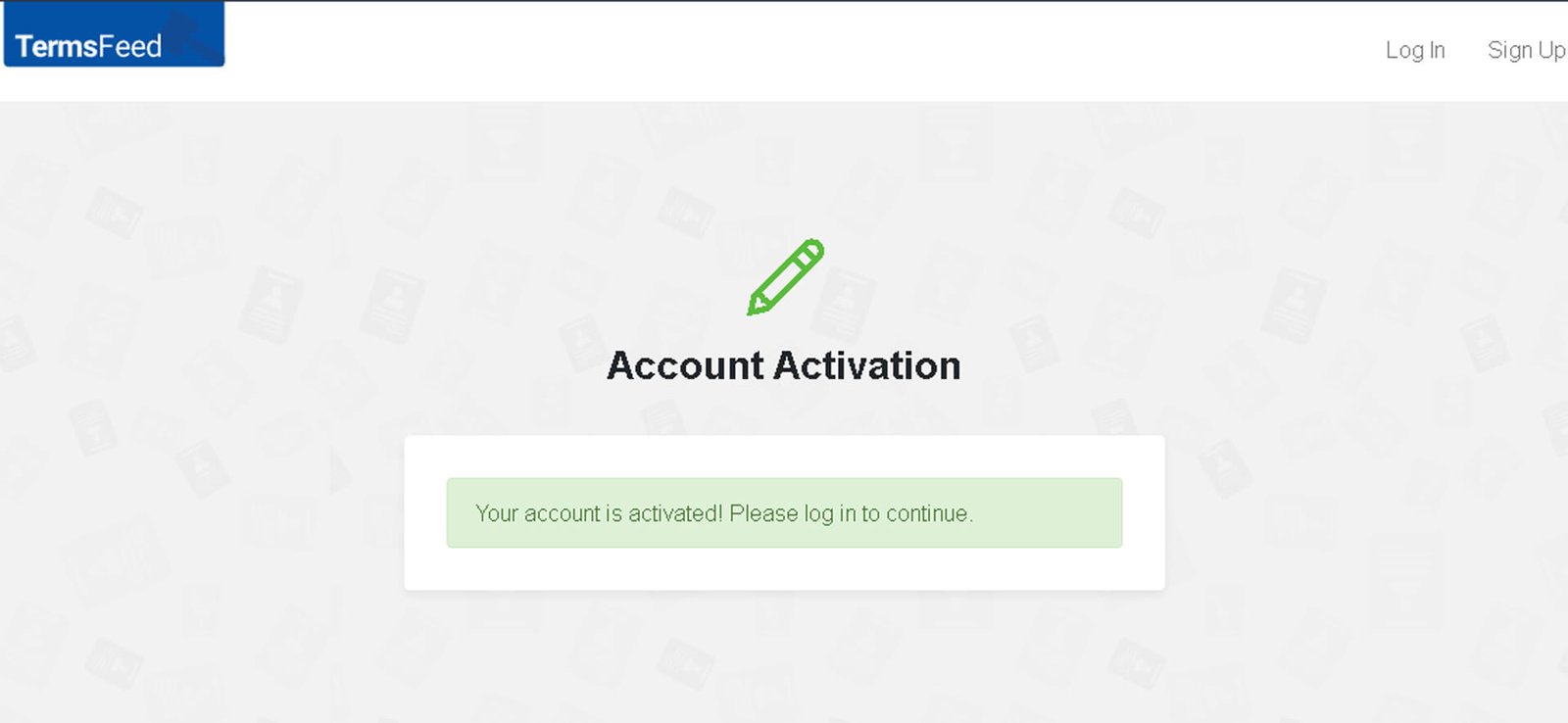
Step 5: You will see your home screen once you log in. Click “Start” in the “Privacy Policy Generator” box.
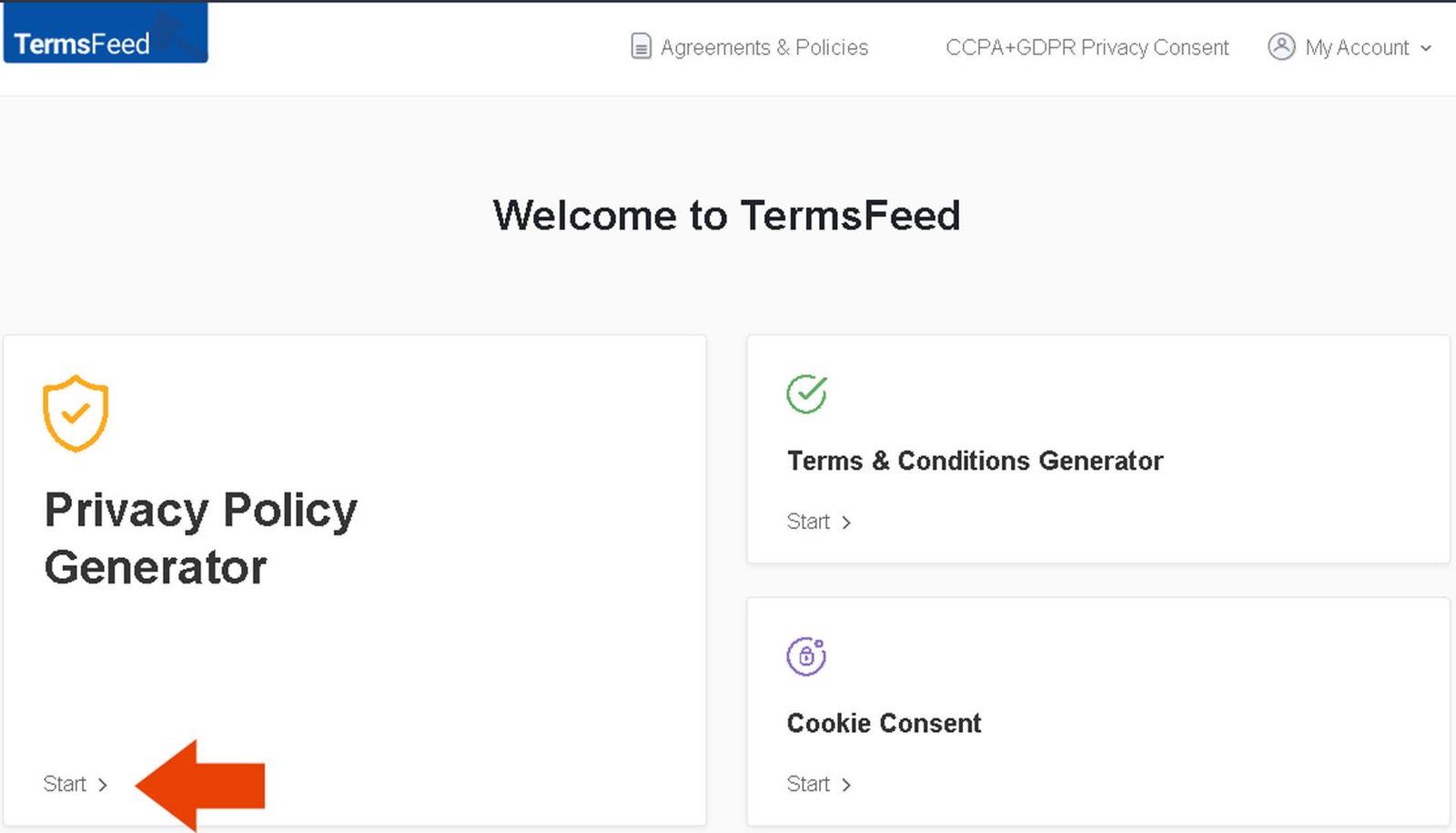
Step 6: We will create a free Privacy Policy for a blog site in this guide. Select “Website” and “NEXT STEP” to continue.
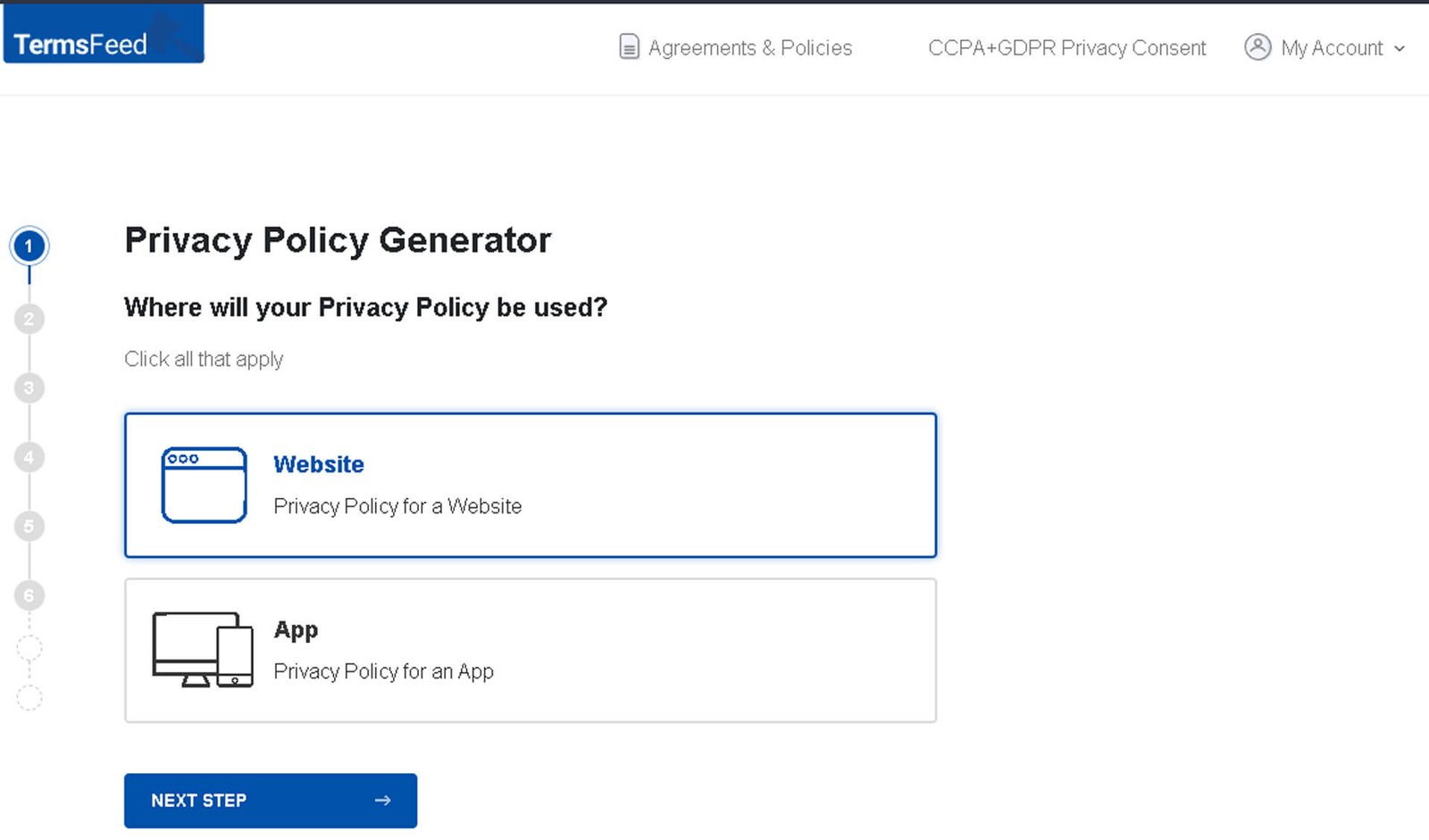
Step 7: Enter your website URL in the What is your website URL? field and your website name in the What is your website name? field.
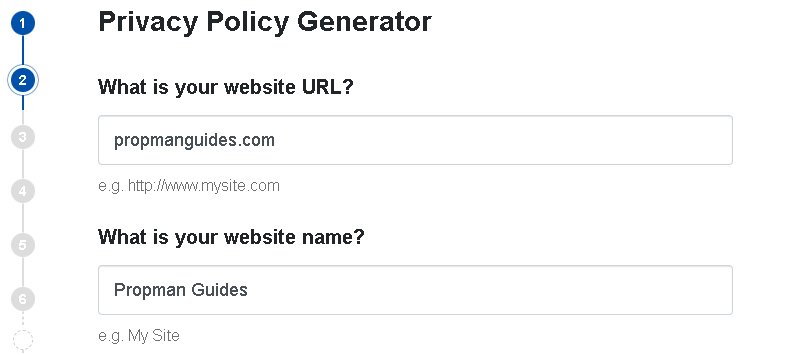
Step 8: Enter your business name in the What is the name of the business? field and the business address in the What is the address of the business? field.

Step 9: Enter the country the website operates in the Enter the country field and the state in the Enter the state field and click “NEXT STEP” to continue.
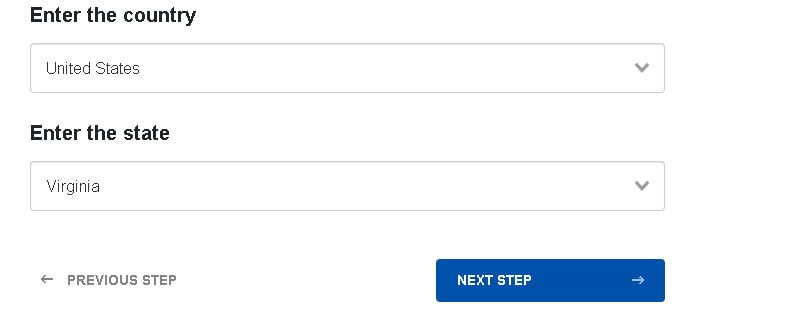
Step 10: Select what personal information your blog or website collects from users and click “NEXT STEP” to continue.
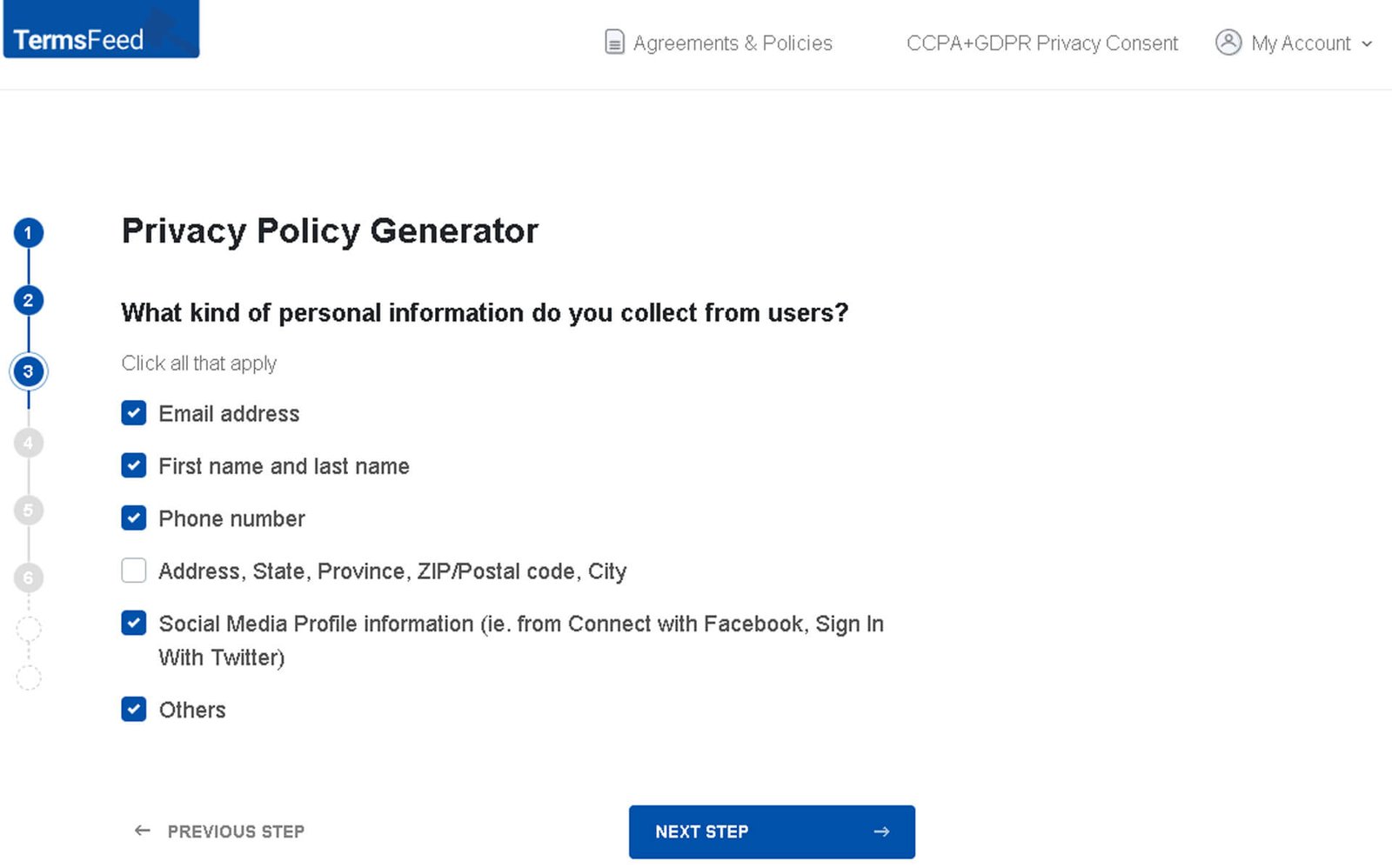
Step 11: Select how you want users to contact you regarding your Privacy Policy.
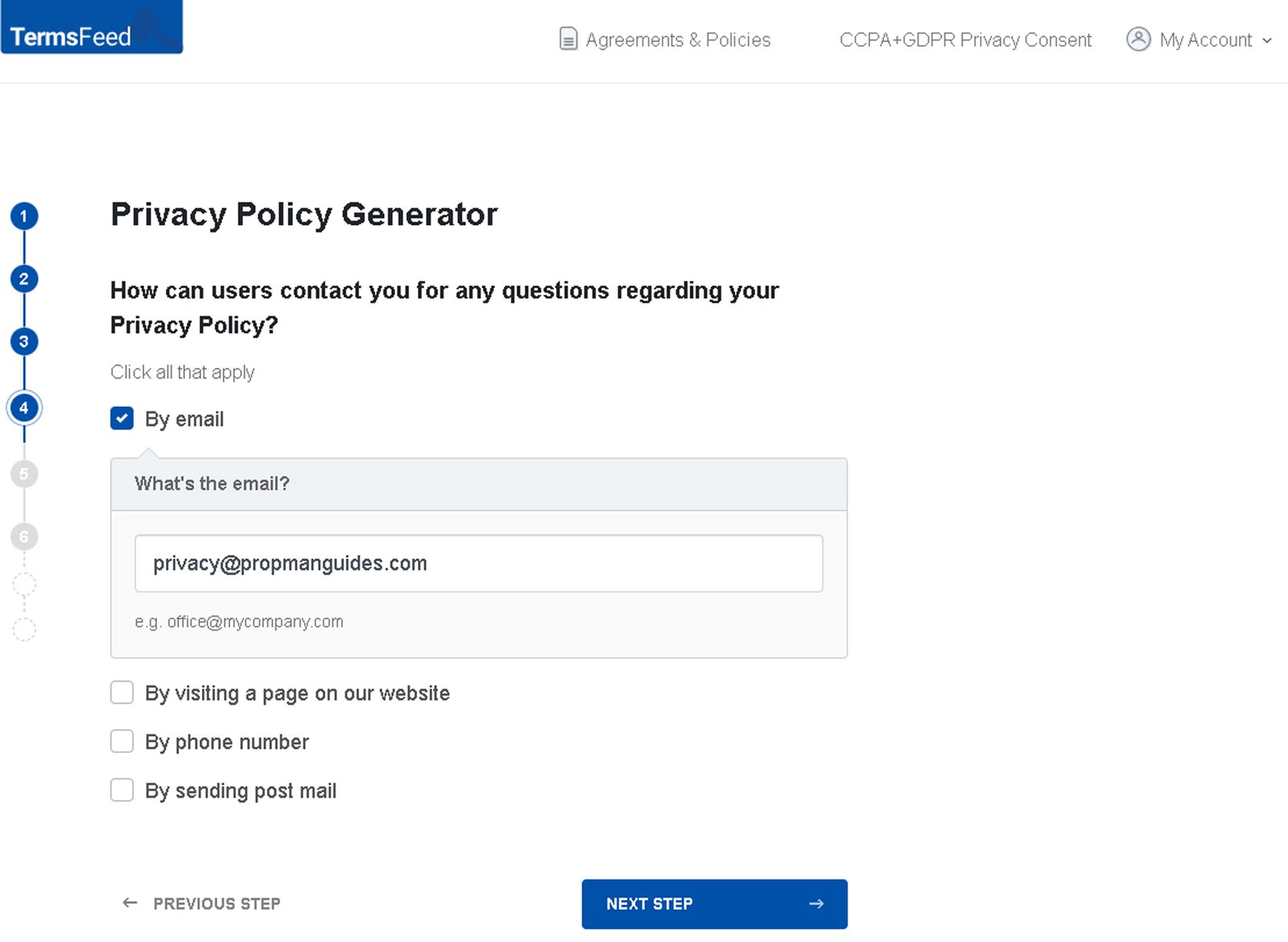
Step 12: For the free Privacy Policy, select the “No, I don’t want a Professional Privacy Policy” option.
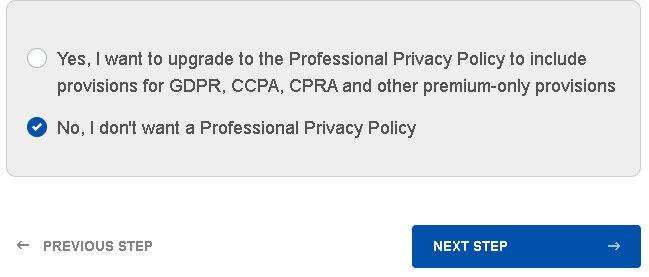
Congratulations! You just generated a free Privacy Policy to post on your blog or website. Revisions are free, and there are discounts if significant upgrades are required. At this point, TermsFeed provides three options to obtain your Privacy Policy:

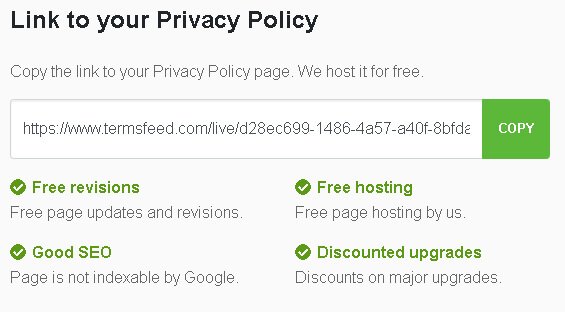
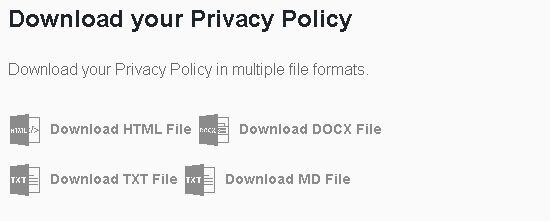
What are some examples of privacy policies?
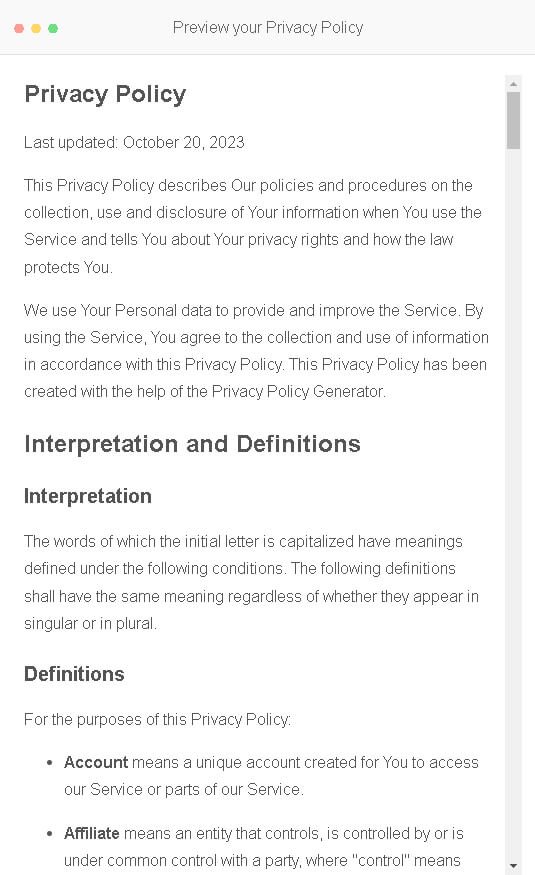
TermsFeed Professional Privacy Policy: Pricing and Features: What is in a good Privacy Policy?
TermsFeed offers a valuable service by providing high-quality samples of privacy policies. Their expertise in outlining essential language ensures businesses have a comprehensive and reliable Privacy Policy.
With the TermsFeed Professional Privacy Policy, you’ll only pay for what you need. There’s a one-time payment only, with no recurring fees whatsoever. You can easily download the file and edit it as you wish. Plus, TermsFeed offers a 7-day Return & Refund policy for your peace of mind.
Check out our step-by-step guide for creating a Google-friendly Privacy Policy, where we will dive deep into the premium options TermsFeed has to offer!
In Conclusion: Prioritizing User Privacy with an Updated and Transparent Privacy Policy
Prioritizing user privacy is of utmost importance in today’s digital landscape. With the increasing concerns surrounding data protection and privacy breaches, businesses must have an updated and transparent Privacy Policy.
An updated Privacy Policy informs users how the company collects, stores, and uses data. It should clearly outline the collected information types, such as personal details or browsing behavior, and how this data is safeguarded.
Transparency plays a crucial role in building trust with users. By being transparent about data practices and providing clear explanations of how user information is handled, businesses can demonstrate their commitment to protecting user privacy.
Tools like TermsFeed can assist you in creating comprehensive and transparent legal documents, including a Privacy Policy, EULA Agreement, Disclaimer, Cookies Policy, and Terms & Conditions Agreement. These documents protect your business legally and reassure users that their personal information will be handled responsibly.
What happens if you don’t have a privacy policy? By not implementing an updated and transparent Privacy Policy, businesses risk compromising user data and losing the trust of their audience. A privacy policy helps protect user data, build trust, and foster a positive relationship between businesses and users. Without a policy ensuring user data’s safety, you risk losing confidence and visitors to your site.












